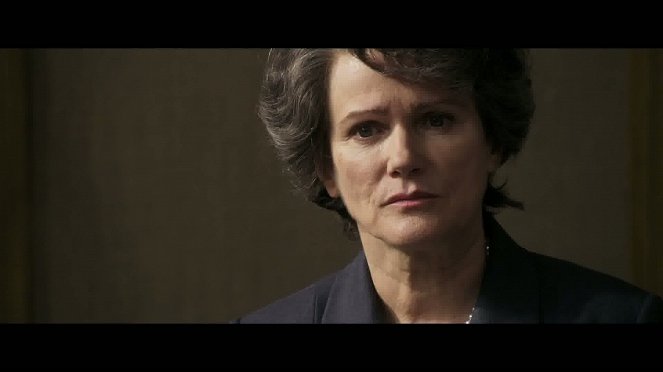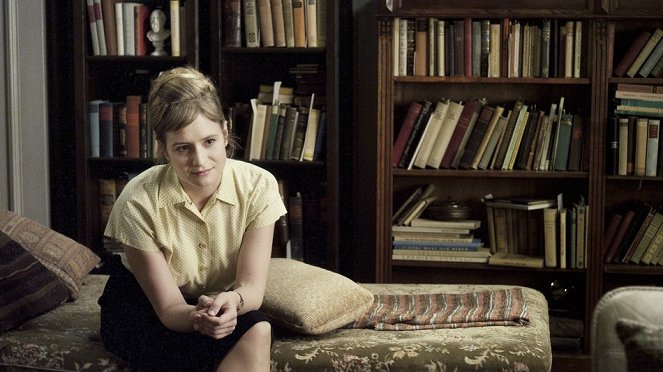Réalisation:
Margarethe von TrottaPhotographie:
Caroline ChampetierMusique:
André MergenthalerActeurs·trices:
Barbara Sukowa, Axel Milberg, Leila Lallali, Janet McTeer, Julia Jentsch, Ulrich Noethen, Michael Degen, Victoria Trauttmansdorff (plus)Résumés(1)
1961 - La philosophe juive allemande Hannah Arendt est envoyée à Jérusalem par le New Yorker pour couvrir le procès d'Adolf Eichmann, responsable de la déportation de millions de juifs. Les articles qu'elle publie et sa théorie de "La banalité du mal" déclenchent une controverse sans précédent. Son obstination et l'exigence de sa pensée se heurtent à l'incompréhension de ses proches et provoquent son isolement. (Sophie Dulac Distribution)
(plus)Vidéo (2)
Critiques (4)
Ce que j'apprécie chez Hannah Arendt, c'est la force de sa personnalité, sa persévérance et sa ténacité dans son combat pour la vérité et ses positions personnelles. C’est la raison pour laquelle, en regardant la remise des prix pour les films allemands, j’ai été enchanté d’apprendre que quelqu’un avait entrepris de faire un film sur elle. Ce n’est pas pour tous les publics, mais je trouve que c’est un choix digne et pertinent pour l’ouverture du Deutscher Filmfest 2013. Barbara Sukowa brille et excelle dès la première minute où elle entre en scène et elle a totalement mérité son prix de la meilleure performance d’acteur. Les moments les plus forts sont la contemplation avec la cigarette et sa conférence/défense devant les étudiants. Je pourrais éventuellement reprocher au film une longueur excessive, mais cet écoulement lent est probablement intentionnel. Je mettrais quatre étoiles, mais au vu de la prestation exceptionnelle de Barbara Sukowa, j’augmente le tout d’une étoile.
()
Hannah can be uncompromising and totally emotionless, but overall, she has one main goal – Adolf Eichmann who will probably keep her awake for the rest of her life. The director Margarethe von Trotta has fairly accurately shot the story of someone who wanted to destroy Eichmann in court. Live action scenes are complemented by real-life shots that can make your blood run cold at times. There are all sorts of people in the world and so I’m willing to believe that they can keep on surprising you throughout life. However, it’s a pity that the two hours of this movie dragged on quite a lot. I felt like the movie was trying to analyze Hanna and Adolf more than trying to tell a unique story. Even so, it’s a story about Nazi Germany that you need to know and watch.
()
Another meeting between Margarethe von Trotta and Barbara Sukowa (or Lola, Berlin Alexanderplatz). This time in a masterful dialogue about the nature of evil. The film focuses on the period in the early 1960s when Arendt was reporting for "The New Yorker" on "Eichmann in Jerusalem: a Report on the Banality of Evil."
()
She did not consider herself a philosopher, but she still thought philosophically. She was present at the trial of Adolf Eichmann, a monster who was supposed to have come up with the plan to finally deal with the Jews. Hitler's engineer of genocide. However, Arendt realized that she was not faced with a monster, but with a normal person. At least at first glance. People do not want to see this. They want to see a monster, they want to see a chimera. Such a monster cannot be like them. That is why Hannah Arendt did not have an easy life and her views were not positively received. Even though she did not defend the monster, they still looked at her with suspicion. The film has great visuals, but most importantly, it draws attention to a thought-provoking theme. The quality execution, which interestingly combines live action with archival footage, is an interesting added value. However, the film itself does not bring much extra and is similarly contrived as "The Iron Lady."
()



Annonces